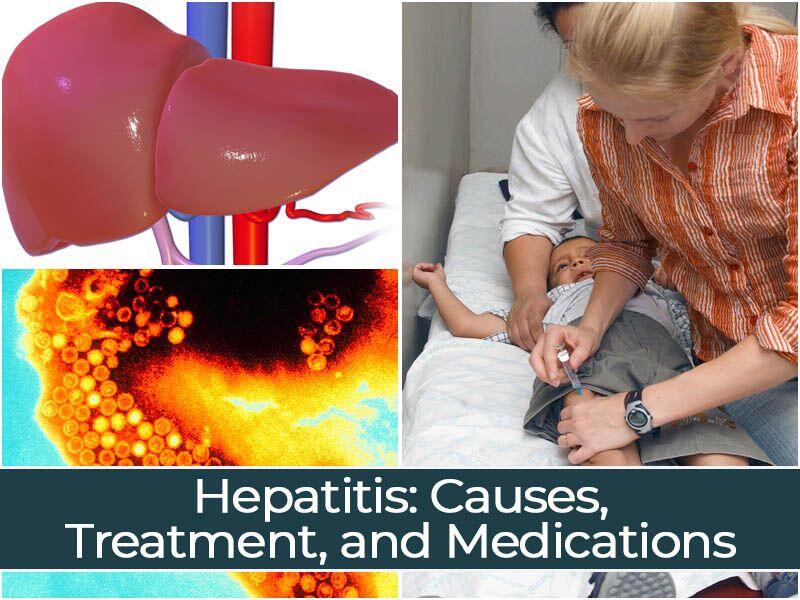Hepatitis: Causes, Treatment, and Medications

Hepatitis is an inflammatory condition of the liver. The liver is found in the right upper part of your abdomen. It has several dangerous functions that affect metabolism through your body:
- Synthesis of clotting factors and blood proteins
- Storage of glycogen, minerals, and vitamins
- Breakdown of fats, carbohydrates, and proteins
- Excretion of bilirubin, cholesterol, hormones, and drugs
- Filtering of toxins from your body
- Bile production, which is essential to digestion
There are 5 types of hepatitis:
- Hepatitis A: This is caused by an infection with the hepatitis A virus that is most commonly transmitted by consuming water/food contaminated by feces.
- Hepatitis B: This is transmitted through contact with infectious body fluids that have the hepatitis B virus. Your risk getting this disease if you have the same injection drug used or sharing razors with an infected person.
- Hepatitis C: This comes with the hepatitis C virus that is transmitted through direct contact with infected body fluids usually through sexual contact.
- Hepatitis D: This is a serious liver disease that is caused by the hepatitis D virus. Hepatitis D is an uncommon type of hepatitis that only happens in combination with hepatitis B infection. Hepatitis D is not able to multiply without the presence of hepatitis B.
- Hepatitis E: This is a waterborne disease that is mostly found in areas with poor hygiene. This usually results from ingesting a fecal substance that contaminates the water supply.
What Causes Hepatitis?
There are various types of hepatitis and with different causes:
- Toxic hepatitis can be caused by certain supplements, poisons, medicines, chemicals.
- Viral hepatitis is the most common type caused by one of several viruses such as hepatitis viruses A, B, C, D, and E.
- Alcoholic hepatitis is caused by heavy alcohol use.
- Autoimmune hepatitis is a chronic type in which your body’s immune system attacks your liver. The cause is not known, but genetics and your environment may play a role.
Signs and Symptoms of Hepatitis
If you have hepatitis B and C, you may not have symptoms in the beginning. Signs and symptoms may not befall until the damage affects the function of the liver. Some of the common symptoms of this disease are:
- Loss of appetite
- Abdominal pain
- Pale stool
- Dark urine
- Flu-like symptoms
- Fatigue
- Unexplained weight loss
- Yellow eyes and skin which might be a sign of jaundice
Risk Factors of Having Hepatitis
The following are the listed factors of getting the disease:
Areas commonly affected by the condition:
- Asia
- South America
- Africa
- China
- Japan
- Vietnam
- United States
Hepatitis spreads when you are exposed to it from contaminated:
- Food
- Water
- Blood
- Stool
- Semen
- Saliva
- Vaginal fluid
The risk is higher for:
- People who do not wash their hands well especially after changing a diaper or using the bathroom
- People with jobs in healthcare, daycare, or public safety
- Men who have sex with men
- Close contact with someone who has or carries hepatitis
- People who have anal sex, oral to anal sex, or many sex partners
- People who have sex with someone who has a sexually transmitted infection (STI)
- Living in or traveling to countries with raw sewage, poor sanitation, or untreated water
Having certain health conditions or procedures such as:
- A weak immune system from a disease or treatment
- An STI or HIV
- Persistent higher than normal liver function tests
- Hemodialysis to treat kidney disease
Safety Precautions
Hygiene
Having good hygiene is one way to prevent contracting hepatitis A and E. If you’re traveling to a developing country, you should avoid:
- Raw fruit and vegetables
- Local water
- Undercooked or raw oysters and shellfish
Hepatitis B, C, and D contracted over contaminated blood can be prevented by not:
- Sharing drug needles
- Sharing razors
- Using someone else’s toothbrush
- Touching spilled blood
Hepatitis B and C can also be contracted through intimate sexual contact and sexual intercourse. Practicing safe sex by using dental dams or condoms can help decrease the risk of infection.
Vaccines
The use of vaccines is an essential key to avoiding hepatitis. Vaccinations are accessible to prevent the progress of hepatitis A and B. Experts are currently developing vaccines against hepatitis C.
Treating Hepatitis
- Hepatitis A: This usually doesn’t require treatment because it is known to be a short-term illness. You may be recommended to have bed rest. If you have diarrhea or vomiting, follow your doctor’s advice for nutrition and hydration.
- Hepatitis B: This is treated with antiviral medications.
- Hepatitis C: Antiviral medications are used for the treatment of both acute and chronic forms of hepatitis C. People who develop cirrhosis or liver disease as a result of chronic hepatitis C may be candidates for a liver transplant.
- Hepatitis D: Accordingly, this can be prevented by getting the vaccination for hepatitis B as infection with hepatitis B is needed for hepatitis D to develop.
- Hepatitis E: This typically resolves on its own. However, it is recommended to get enough rest and nutrients, drink plenty of fluids, and avoid alcohol.
Medications for Hepatitis
- Telbivudine
- Adefovir
- Lamivudine
- Tenofovir
- Entecavir
- Sofosbuvir
- Simeprevir
- Ribavirin



